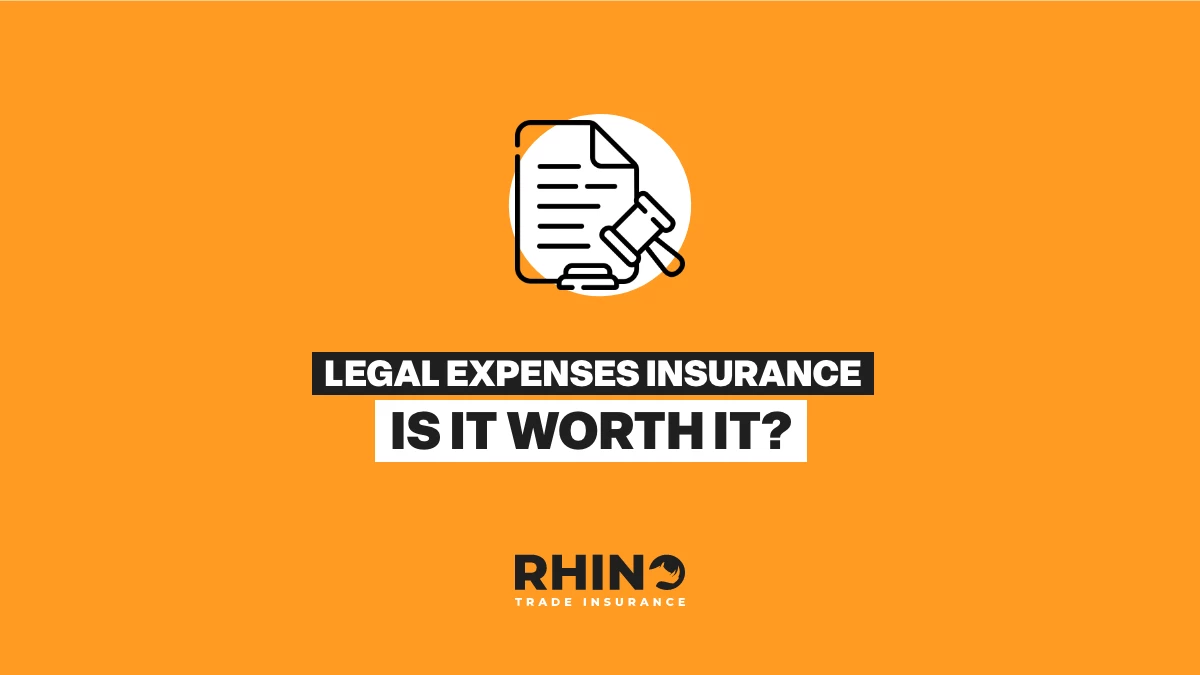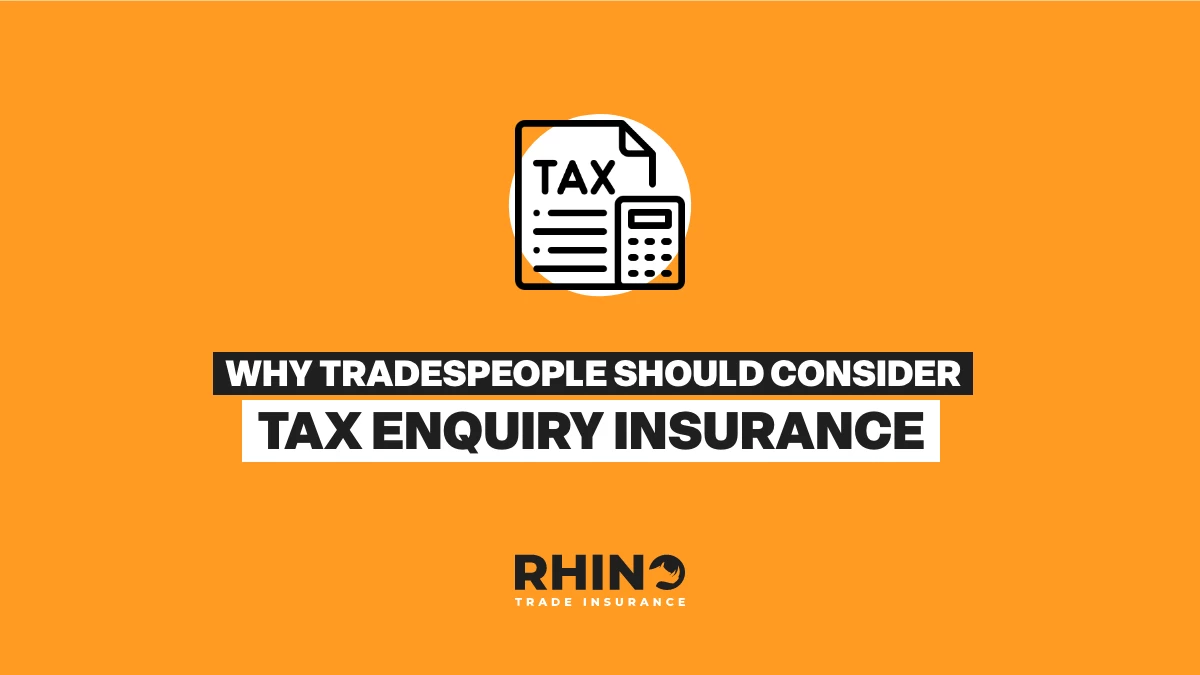
Legal Expenses Insurance – Is it Worth It?
Legal Expenses Insurance for tradespeople explained—what it covers, when you might need it, and how it protects against costly legal fees.
Nobody knows the value of following health and safety rules better than a tradesman, or a tradeswoman for that matter. Whatever trade you’re in, and whether you swing a hammer, wield a saw, tout a screwdriver or clutch a cordless drill, if you make your living in the trades industry then you will have a better grasp than most people about the importance of health and safety.
Because your job is downright dangerous compared to many people’s. We’re not saying that office work doesn’t come with its hazards (a printer could catch fire for example!) but it’s clear that trades roles are the ones that pose most risk to your physical safety. This is why adopting safe working practices is so important.
At Rhino, we see first-hand the havoc that personal accidents and accidental damage can wreak on a small trades business, so tradesmen safety is something we’re passionate about. Let’s take a quick look at how health and safety, together with insurance, can give you 360-degree protection.
‘Health and safety’ is a broad term. When used in a workplace context, it covers the set of rules and regulations in place for the prevention of accidents and the minimising of health hazards for employees.
Health and safety is important in all professions, but there’s a clear need to prioritise it in the hazardous trades world.
As a basic overview, health and safety covers things like:
Every single tradesperson should have a clear health and safety procedure in like with UK law and legislation, incorporating training and education, audits and checks, PPE, tool maintenance, risk assessments, a culture of communication, first aid/ emergency plan and measures in place to promote good mental wellbeing. This should be the case whether you have one person in your team (you), or a small army of tradespeople working under you.
The most obvious benefit of health and safety at work is that people are kept safe and that instances of work-related harm, and injury, death and illness are reduced as much as possible. But there are other benefits, too:
Working a trade can be a tough job, so making it even tougher by sidestepping health and safety responsibilities isn’t the smartest option. Similarly, skimping on insurance because you follow health and safety rules is like thinking you don’t need a parachute when jumping out of a plane because you’ve spotted somewhere soft to land. Basically, when it comes to health and safety protocols and insurance, it really isn’t a one-or-the-other type thing.
So, while you need to follow health and safety regulations to the letter, insurance is the other side of the health and safety coin – and no matter how robust your health and safety protocols are, you still need to underpin them with insurance. Think of it like working at height. Of course, you’d go through the usual precautions, including guard rails and a secure scaffold, but it’s the safety harness you clip onto your belt while you’re halfway up a building that’s going to be your insurance in case you do fall.
Here are a few ways insurance and health and safety standards go hand-in-hand:
Insurance is your partner in health and safety. Having insurance won’t stop accidents from happening, but it will swoop in if something untoward does occur, helping to put things right. For example, if you should accidentally injure someone while you’re working, you can rely on your Public Liability Insurance to cover the associated costs, including medical expenses, legal expenses and the cost of any settlement or damages.
Having insurance policies in place means an increased focus on health and safety overall. You and your staff will be hyper-aware of the risks presented by your work, and the possible repercussions. Knowing that you’re shelling out each month to keep your tools protected, cover accidental damage and to foot the bill if you accidentally injure someone will make you more careful, not less. This is because the daily risks and hazards of your work will be at the forefront of your mind.
At Rhino HQ, we deal with claims from tradespeople every single day. We can report that accidents happen frequently, even to tradespeople with the most rigorous health and safety protocols in place. So, best practice is the minimum standard you should strive for.
There is a range of legislation that applies to workplaces in the UK under the Health and Safety at Work Act 1974 and the Management of Health and Safety at Work Regulations 1999 – and that includes your trades business. However small your operation may be, regulations and laws apply. This includes providing the proper equipment to employees, and having Employer’s Liability Insurance if you hire anyone.
If you want to save money on your trade insurance, you should talk to Rhino. We have some of the lowest rates on the market and our status as experienced brokers means we scan the market to find the best cover for our customers. Our rates are up to 40% cheaper – so we’re talking about some serious savings.
But there’s a way to reduce the cost of your insurance even more. Did you know there’s benefit in maintaining high safety standards for insurance purposes? How well your trades business adheres to health and safety has a direct impact on the cost of your policies. Your premiums will be lower if you haven’t made a claim before, as your insurer will see that you take health and safety seriously and present a low risk.
Rhino have previously blogged about ways to help prevent accidents in the trades, which will help keep your claims to a minimum and your insurance premiums nice and low.
Overall, protecting your trades business isn’t just about one strategy. Rather, you need to protect yourself from all angles. Health safety is your first line of defense and having a strict protocol in place will prevent many avoidable accidents from occurring in the first place.
You also need insurance as your back-up for when things go unexpectedly south. You can never prevent the unexpected, so insurance will step in during those times. Remember, the more closely you follow health and safety regulations, the more you’ll reduce the likelihood of accidents and incidents. This means you’ll make fewer claims on your insurance, keeping premiums down!
When it comes to insurance for trades, Rhino have your back. Give us a call today on 0116 243 7904 to find out how we can help keep you and your trades business safe and protected.
Legal Expenses Insurance for tradespeople explained—what it covers, when you might need it, and how it protects against costly legal fees.
Worried about a tax investigation? With HMRC cracking down in 2025, Tax Enquiry Insurance from Rhino gives UK tradespeople expert protection and peace of mind.
Rhino Trade Insurance CEO Troy Stevens joins industry leaders at the House of Commons to discuss the rising issue of tool theft—highlighting its impact on UK tradespeople and the importance of awareness and protection.
Tell us your trade and get a tailored insurance quote for your business in seconds
Our team of experts are available to talk to Mon-Fri 08.30-17.30 and Sat 10.00-14.00

